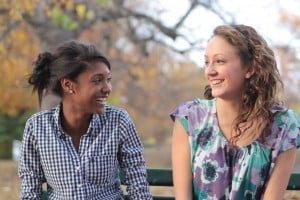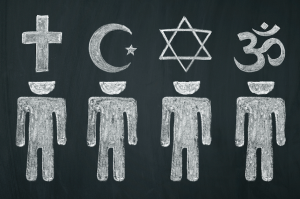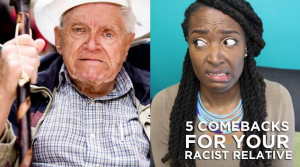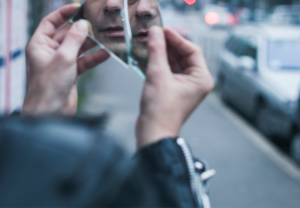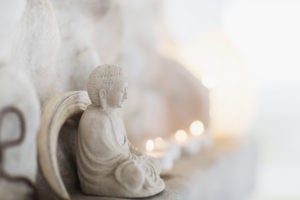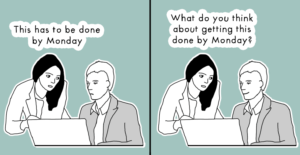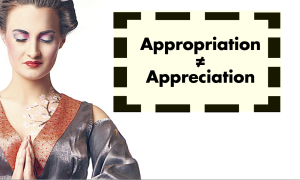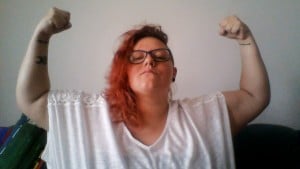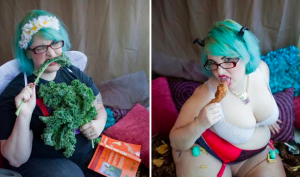Adamo Ruggiero: So I was thinking the other day, like, when I was bullied at school or whatever growing up, I could just go home and like cry to my mother and escape it. But then I was thinking, you know, with like the online world, that stuff follows you, doesn’t it?
Multiple Students: Yeah, it does.
Adamo Ruggiero: How do you guys feel about this concept? Like, do you feel like you can escape a bully in the age of social media?
Student 1: My dad was telling me how when he was younger, you went outside and you like had fun with your friends outside, because they didn’t have all, like, the technology that we have nowadays. And since we have this technology, it could be a good thing and a bad thing: ‘Cause, good, hey we can like search up things easily without going to the library. That’s great. But, then (multiple participants laughing), there’s also the fact that there’s no escaping it.
Student 2: Like, I find now having like social media, there’s like a track on it. So, like, you can’t forget it as easily, ’cause, like, there’s a mark. So, like, it’s still on Twitter. It’s still on Facebook. And those things don’t just disappear. Everything’s now out there, and it’s permanent.
Student 3: Once you pull something on like online, it might’ve delete the post, but it’s going to be, always, out there. You can’t take it back. It’s there and they remember, and it’s going to haunt them, because that’s happened to me before. And it still follows me every day. And, like, it lowers your self-esteem most of the time because you have those words in your head, saying how you can’t accomplish something because someone said you couldn’t when you were, like, in grade four, and that still haunts you.
Student 4: You never know who’s that person behind who you’re talking to, especially now you can go anonymous on Ask FM. I know, for starters, it’s where you ask, like, people questions and people can ask you anonymously, so you can be getting really hateful comments that really put your self-esteem down, and you don’t know who it is.
Student 2: Like there was even this app called Yik Yak, and it’s basically people in your location have access to, like, this kind of, like, database, I guess. And it’s basically like Twitter where you, like, post up or you can say what you want and it posts, and everyone can see it in your area. So it was pretty much made to make fun of other people. And there was constantly, like, people saying bad things about each other, and sometimes it was their friends saying it, and it was a joke to them and their friends, but then if they saw it and they were like, “Oh, well, actually that’s true.” And it, just like, it’s all around you.
Adamo Ruggiero: What do you do? Like where do you start?
Student 5: I was anonymously bullied before, and so I went and I told my parents, and it was all through a school thing that happened. It was like an online through school, and people had access to other people’s accounts. And so they were, like, posting rude stuff, saying it was from me, but I didn’t know exactly who it was. And, so, I did end up bringing it to teachers and stuff, and they went through it. But, even then, I still don’t know who it was because they said that they needed to keep the bully anonymous because they wanted to protect the bully, as well as the victim. And, so, everybody knew it was me who was being bullied, but nobody knew who the bully was.
Adamo Ruggiero: Are there responsible ways, then, to live online you think?
Student 3: Like, knowing who I am, and stuff like that, and, like, who I was, who my parents grew me up to be – like if you do not know the person face-to-face, you cannot be a certain, like 100% sure, it’s them online, because you can be easily catfished, and you can expose secrets and things about your life and thinking it’s your friend and knowing it’s not.
Student 4: Another thing is, on social media, people usually say worse things than necessarily to your…
Adamo Ruggiero: (completes Student 4’s thought) Face.
Student 4: (continues) Yeah, because they think they can get away with it.
Student 1: There’s a big stereotype of bullies that are not on the Internet, that they’re all big and buff, but bullies can, on the Internet, can still be small. They can be any type of person, and they can still bully.
Krista: Do you block them? Or do you think that just makes the problem worse?
Student 1: I don’t block anyone. I just kind of take a break from social media website, and read a book or something.
Student 2: I feel like there’s a lot of good as well though to social media. Like I know our school has a thing called “Call for Compliments.” And basically (the group recognizes the name). Yeah. And I feel like more schools should kind of have that, and basically, it’s, like, on Facebook. And there’s this one person who runs the account, and no one really knows who that is, but you can send in anonymous compliments to people.
Adamo Ruggiero: What I’ve realized, no matter if we’re passing notes or sending Snapchats or whatever, it’s like, I know this sounds so cheesy, but what a difference saying something nice feels versus saying something mean, like genuinely what a difference. Like everybody can just go about their way.
Student 3: Like you get that warm feeling in yourself, like you feel proud in yourself, like awe, you just feel, like, happy. You just feel genuinely happy. You feel proud of yourself that, that you’re doing something right, and that person notices, and you feel, just, like you’re glowing.
Adamo Ruggiero: You guys, you’ve spoken so well on this. What advice, or just something for young people to do when they feel bullied on social media?
Student 3: Tell a parent.
Student 1: Tell a parent. Maybe even like I said, take a break for a little while. Even if it’s just watching a movie or doing something that you personally enjoy. That brings a whole lot more joy, and then, once you’ve calmed down clear-minded, go back and deal with it.
Student 2: Even though it seems directly to you and you’re like, “Oh I’m by myself.” You’re not alone. Go tell a teacher. Find friends. I find there’s ways to get around it, and if you sit there and try to, like, resolve it by yourself, it’s only going to make it worse.
Student 4: There’s more to life than what’s just on your screen. So I feel like, just surround yourself in your positive bubble. You know who you are. Your family knows who you are. Who cares, really, knows who you really are. And honestly, even if you want to go on social media, just make sure all your settings are good so that you have the most control over who’s saying what to you.
Adamo Ruggiero: Listen, bullying always existed in high school. That is nothing new. Words do hurt, regardless of the ‘sticks and stones.’ Thank you guys for chatting with us.





